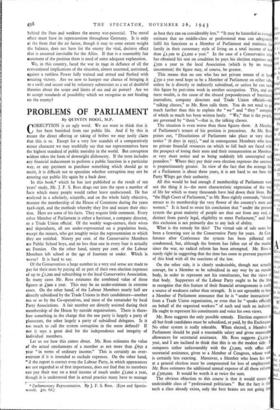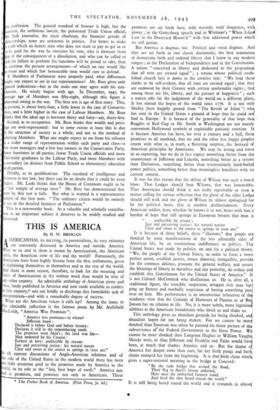PROBLEMS OF PARLIAMENT
By QUINTIN HOGG, M.P.
CORRUPTION is an ugly word. We are wont to think that it has been banished from our public life. And if by this is meant the direct offering or taking of bribes we may justly claim that this is so. Except for a very few scandals of a comparatively minor character we may truthfully say that our representatives have the highest standard of public morality in the world. But corruption seldom takes the form of downright dishonesty. If the term includes any financial inducement to perform a public function in a particular way, or any payment to purchase something which should go to merit, it is difficult not to speculate whether corruption may not be entering our public life again by a back door.
In this book,* which he has just published as the result of ten years' study, Mr. J. F. S. Ross drags out into the open a number of facts which many people would rather leave undiscussed. He has analysed in a scholarly, scientific, and on the whole fairly objective, manner the membership of the House of Commons during the years 1918-1936, and the methods whereby they live and secure their elec- tion. Here are some of his facts. They require little comment. Every other Member of Parliament is either a barrister, a company director, or a Trade Union official. Of the weekly wage-earners, their wives and dependants, all are under-represented on a population basis, except the miners, who get roughly twice the representation to which they are entitled. Ninety per cent. of the Conservative Members are Public School boys, and no less than one in every four is actually an Etonian. On the other hand, ninety per cent. of the Labour Members left school at the age of fourteen or under. Which is worse? It is hard to say.
Of the Conservatives a large number in a very real sense are made to pay for their seats by paying all or part of their own election expenses of up to £1,200 and subscribing to the local Conservative Association. In many cases Mr. Ross estimates the combined value of these figures at L900 a year. This may be an under-estimate in extreme cases. On the other hand; of the Labour Members nearly half are directly subsidised by the Trade Unions in their candidature—another ten or so by the Co-operatives, and most of the remainder by local Party Associations. A fair number are directly assisted during their membership of the House by outside organisations. There is there- fore something in the charge that the one party is largely a party of plutocrats, the other largely a party of subsidised delegates. Is it too much to call the system corruption in the sense defined? If not it says a great deal for the independence and integrity- of individual members.
Let us see how this comes about. Mr. Ross estimates the value of the actual emoluments of a member as not more than £650 a year " in terms of ordinary income." This is certainly an over- estimate if it is intended to exclude expenses. On the other hand, " if the report is correct even the Labour Party, in which appearances are not regarded as of first importance, does not find that its members can pay their way on a total income of much under kr,000 a year, though it is understood that in actual practice many have to manage * Parliamentary Representation. By J. F. S. Ross. (Eyre and Spottis- woode. Jos. 6d.)
as best they can on considerably less." "It may be hazarded as a rou estimate that no middle-class or professional man can adequat fulfil his functions as a Member of Parliament and maintain family in their customary style of living on a total income of 1 than £1,5oo to £2,000 a year." In the case of a Conservative who has -obtained his seat on condition he pays his election expenses and £5oo a year to the local Association (which is by no means uncommon) the figure may, of course, be greater.
This means that no one who has not private means of at lea £350 a year need hope to be a Member of Parliament on either side unless he is directly or indirectly subsidised, or unless he can earn this figure by part-time work in another occupation. This, and not mere wealth, is the cause of the absurd preponderance of barristers, journalists, company directors and Trade Union officials—the " talking classes," as Mr. Ross calls them. You do not need to go much further than this to explain the " we " and " they " complex of which so much has been written lately. " We," that is the people, are governed by " them "—that is, the talking classes.
The situation is even worse than these figures show. A Member of Parliament's tenure of his position is precarious. As Mr. Ross points out, " Dissolutions of Parliament take place at very short notice " (6 days in 1935), " and in consequence Members who have no private financial resources on which to fall back are faced with the prospect of losing their seats and their remuneration as Members at very short notice and so being suddenly left unoccupied and penniless." Where they pay their own election expenses the sanction is proportionately greater. In view of the fact that the average life of a Parliament is about three years, it is not hard to see how the Party Whips get their authority.
All this would be bad enough if membership of Parliament w not the thing it is—the most characteristic expression of the way of life for which so many thousands have laid down their lives. But "the High Court of Parliament," as Mr. Ross rightly contends, "should attract to its membership the very flower of the country's men and women." It is hard to resist his conclusion that " under the present system the great majority of people are shut out from any real, as distinct from purely legal, eligibility to enter Parliament," and that this exclusion is not primarily due to any lack of ability.
What is the remedy for this? The virtual sale of safe seats has been a festering sore in the Conservative Party for years. At Con- ference after Conference the system has been pilloried and condemned, but, although the bottom has fallen out of the market since the war, no radical reform has been attempted. Mr. Ross is surely right in suggesting that the time has come to prevent payments of this kind with all the sanctions of the law.
On the other side, it is clearly undesirable, though not actually corrupt, for a Member to be subsidised in any way by an outside body, in order to represent not his constituents, but the views of that body. Supporters of the Labour Party ought to be the first to recognise that this feature of their financial arrangements is really a source of weakness rather than strength. It is not agreeable to heat a Member of Parliament announce that he is " under instructions from a Trade Union organisation, or even that he " speaks officially on behalf of the organised workers " of such and such an industry. He ought to represent his constituents and voice his own views.
Mr. Ross suggests the only possible remedy. Election expenses o all but freak candidates must be subsidised, or paid, by the Exchequer. No other system is really tolerable. When elected, a Member of Parliament should be paid a reasonable salary and given reasonable allowances for secretarial assistance. Mr. Ross suggests k1,000 year, and I am inclined to think that this is on the modest side. IS compares rather unfavourably with the £2,000, with office and secretarial assistance, given to a Member of Congress, whose work is certainly less exacting. Moreover, a Member who loses his seat at a general election must be compensated for loss of employment Mr. Ross estimates the additional annual expense of all these reforms at £5oo,000. It would be worth it at twice the sum.
The obvious objection to this course is that it would create undesirable class of "professional. politicians." But the fact is such a class already exists, only the best brains are not going i ly is
an at to
0 0
he profession. The general standard of honour is high, but the areerist, the ambitious lawyer, the pensioned Trade Union official, he flash journalist, the mere charlatan, the financier greedy of irectorshiPs, none are unknown in politics. Far better to make t a job which an honest man who does not want to pay to get in or o be paid- for the way he exercises his vote, who is immune from ear of the consequences of a dissolution, and who can be called to ask for failure to perform his functions will be proud to take, than o continue the present arrangements—of which no one would like o boast and which few honourable men would care to defend.
If Members of Parliament were properly paid, what differences fight one expect to see in our representation? Mr. Ross gives only eneral indications—but in the main one may agree with his con- fusions. He wisely begins with age. In December, 1942, the verage age of Members was fifty-eight, although this figure is bnormal owing to the war. The best test is age of first entry. This, t present, is about forty-four, a little lower in the case of Conserva- ves, and a little higher in the case of Labour Members. Mr. Boss hinks that the ideal age is between thirty and forty—say, thirty-five. Second, as to occupation. Mr. Ross thinks that wealth and privi- ege are over-represented : but to some extent at least this is due o the structure of society as a whole, and not to the method of electing Members. What one might expect to see from his reforms a wider range of representation within each party and class—a ew more managers and a few less owners in the Conservative Party, ewer barristers in all parties, fewer Trade Union officials and more niversity graduates in the Labour Party, and more Members with secondary (as distinct from Public School or elementary) education all parties.
Thirdly, as to qualifications. The standard of intelligence and • eenness is not low, but there can be no doubt that it could be even igher. Mr. Laski thinks that the House of Commons ought to be " fair sample of average men." Mr. Ross has demonstrated that ven by this test it fails. But what is wanted is a representative ample of the best men. " The ordinary citizen would be entirely t sea in the detailed business of Parliament."
This is a noteworthy book. As a valuable and scholarly contribu- on to an important subject it deserves to be widely studied and iscussed.



























 Previous page
Previous page